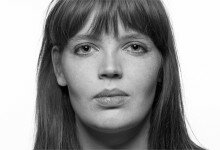Working with the poet
A translator’s view of Israel’s most anti-establishment poet, over the last forty years. “From the beginning of his career, he has converted despair and disgust into wit and irony, with hard-hitting language and a wry smile.”
In a world where the management of the news is more urgent than trying to understand the history behind it, or the forces that shape it, comes Meir Wieseltier, all six feet, three inches of him, halo of silvery white hair, looking like an aging basket-ball player or an unbearded, misplaced prophet walking his English setter through the traffic-snarled streets of south Tel-Aviv, releasing his torrent of words for many Israelis unable to cope, punching holes in what’s left of our frayed representations of love and war. “I can’t stand political poetry: that civil and prophetic posturing/ (Why should anyone speak in broken lines?)”
These lines from ‘Pro & Con’, which was published in 1983, call on the poet to be silent:
let the poet turn inward, let him study his navel,
dream of his father and mother,
or draw pigeons on the neighbor’s roof
a street in the city, a house on the street,
a room inside the house, an orange peel on the table
slowly
drying
But he goes on to say:
. . . sometimes I can’t control myself, and like a pervert
I sneak up on the wax figures’ display.
Here they are lined up in a row, these gawky masks in charge
of deciding our fate . . .
The sight of these leaders posing “with the postures of men who get things done . . . smiling their smiles almost like humans . . . ” drives him, in the end, in a furious closing stanza, to incoherence.
Meir Wieseltier first brought me some of his poems to translate for the Spring, 1977 issue of the Chicago journal Tri-Quarterly, featuring contemporary Israeli literature. It was soon after I arrived in Israel. Our friendship started in a cloud of smoke from his Gauloises cigarettes (which I managed to survive), and grew over the many years that followed. As we consulted, argued, and read his poems together, I refined my understanding, and struggled to transform his Hebrew words – their sense and sound – into English (really, American) poems.
Wieseltier, who rails against “political poetry” in the poem quoted above, has written the most powerful poems of social and political protest in Israel, poems that are tragically timeless like ‘Sonnet Against Making Blood Speak Out’, first published in 1984:
If I die one day from the bullet of a young killer
or in a bomb explosion while I’m checking the price
of cucumbers in the market, don’t dare say
that my blood permits you to justify your wrongs . . .
A deeply caring part of him and his critical awareness temper his fury. He is no longer the “bad boy” of the sixties (there were some would-be Allen Ginsbergs and Dadaists in those days enlivening Tel-Aviv in smoke-filled cafes and in new little magazines, some of which Wieseltier edited), when he and a few other young poets, especially Yonah Wallach and Ya’ir Hurwitz, were exposing every human and inhuman frailty, turning traditional Hebrew poetry inside out, making the ancient Hebrew language new for their generation, as Yehuda Amichai, the most accomplished and admired poet of the preceding generation, and Natan Zach had done in their time.
Now Wieseltier, in an age of cyberspace and terrorism and damaged hope, is the distinguished recipient of the Israel Prize, his country’s highest honor, awarded on Independence Day in the millennial year 2000 in the presence of the Israeli establishment (President, Prime Minister, Minister of Education, Chief Justice of the Supreme Court, Mayor of Jerusalem, etc.) to its most anti-establishment poet. A poet of intense engagement, historical awareness, and verbal power, he was given “the highest possible honor in Israel for his long standing, subversive work,” according to one critic at the time.
But there is more to Wieseltier than subversion. The accumulation of tragi-comic detail in his poems, black humor, visceral imagery offers no escape from the-way-it-is. His words force us to confront the absurd and seamy side of life, head-on. One of his most stunning early poems, ‘Isaac’, is about child abuse in a shabby Tel-Aviv office, written in the early seventies, before the avalanche of such stories and poems. The sexually charged language focuses on the surroundings and pathos of the boy who finally found a summer job when he was picked up in the steaming streets of the first modern city on the Mediterranean coast.
Wieseltier has been strongly rooted in Tel-Aviv, ever since he came to live and go to school there in 1955, cherishing his love/hate relationship with the city, poking into its darkest corners with cool appraisal, even its unbuilt subway (‘Weather’, ‘Isaac’s Story’, ‘Sky-Writing’, ‘Naive Painting’, ‘The Man at the Piano’, ‘The Tel-Aviv Subway’). He is equally at home in the Hebrew Bible, often using its ancient phrases as well as characters to illuminate contemporary disasters. All his distrust of the rhetoric of religious devotion culminates in the last couplet of the final stanza of ‘Abraham’:
Abraham didn’t value a thing in the world but God.
Against Him, he never sinned, no difference between them.
Unlike Isaac who loved his uncouth son, unlike Jacob
who slaved for women, who limped from God’s thrashing all night,
who saw angeled ladders only in dreams. Not Abraham.
He loved God and God loved him. And together
they counted the righteous in the cities before wiping them out.
In making a representative selection from more than forty years of Wieseltier’s poems, I discovered that our choice of translations had been highlighting continuing themes – anti-clerical (‘A Request’, ‘Adoshem’, ‘Burning Holy Books’), anti-government (‘The Secret of Authority’, ‘Garbage Dump 2000’, ‘Pro & Con’), anti-war and anti-military (‘Song of the Last Soldier’, ‘Call-Up’, ‘Salt on the Wounds of the Land’, ‘To be Continued’). Even anti-poetry, demonstrating his profound skepticism of poetry as communication in poems such as ‘Take’ and ‘Poetry Swallowed’.
Wieseltier can be merciless in his polemic against state-funded orthodox religious coercion or political rot and wrongheadedness, but slyly comic at the same time. From the beginning of his career, he has converted despair and disgust into wit and irony, with hard-hitting language and a wry smile. His voice is alternately anarchic and involved. Angry and caring. Serious and hilarious. Cacophonous and lyric. ‘The Soliloquy of Dada the Cat’ is an exquisite rendering of that voice.
There is more pain than bitterness in many of Wieseltier’s recent poems, as in his anguish over the disastrous collision of two Israeli helicopters in mid-air, filled with seventy-three young Israeli soldiers on their way to the war in Lebanon (‘On the Seventy-Three’). The pain overrides the rage in lines like these:
all these corpses and wounded and disabled are so real
that any rhetoric is beyond them, their lives are finished,
even their likely screams have faded somewhere in Lebanon.”
Still there is a strongly affirmative resonance beyond the sorrows and futilities in many of these poems, an enduring resonance as in ‘The Flower of Anarchy’, a love poem from which the title of this book is taken. Freedom, the essential spirit of anarchy, waves its banners, and even its dog’s ears (‘Poems with a Dog, 3’), throughout Wieseltier’s work. Freedom from State, from religion, from any apparatus or relationship that would constrict or shackle it. But beyond Bakunin, and earlier writers and philosophers, Wieseltier seems closer to the American poet Hayden Carruth, an anarchist by his own definition: “no doctrine, no ideology . . . no party line, no required procedure, no orthodoxy.” These have been Wieseltier’s guiding principles throughout his writing career. As Dada the cat says in the last line of his soliloquy, like God, to Moses (and like Popeye too): “I am what I am.”
Love is a well-explored theme here – love of memorable women, and for his mother in the compassionate ‘Letters’ 1 and 2. His work is full of zest for experience, notably in his travels, and a voracious appetite for life. He displays a lonely, yet comic, sense of himself as a defender of human values (‘I Ask Myself’) and human foolishness (‘Musée Picasso’). He enjoys the influence of many poets in other languages: Apollinaire, Mallarmé, Neruda, Cavafy, Yeats, Eliot, Cummings, Pound. It is not easy to balance all this with the rage against everything wrong in our place and in our time. But has it ever been different for poetry?
Meir Wieseltier was born in Moscow in 1941, and taken in the same year by his mother with two older sisters on a half-starving trek to Novosibirsk in southwestern Siberia, when hundreds of thousands of people – women, children, and the aged – were evacuated from Moscow because of the war. He never knew his father, who was killed as a soldier in the Red Army in Leningrad. After the war and the wandering with his family as a DP through Poland, Germany, and France, he arrived in Israel in 1949, the first year of the newly declared State. A bittersweet nostalgia for his preteen years, uncorrupted by symbols of nationalistic fervor, in the small town of Netanya, is lyrically caught in ‘Far from the Flag Parade’ included in his latest book:
It was sweet, dark, and tangy
under the heavy branches
of the citrus trees bent
around Ein-Hatkehelt and Avikhail.
I called it homeland.
Shade streaming from the trees,
the heavy heads of the Shamutti oranges
scattered around me,
a glowing, saturated yours-for-the-taking,
far from the flag parade,
I called it homeland.That was a long time ago. A kind of piratical act
of a boy who found
something he wasn’t looking for.
This is the first book-length collection of Meir Wieseltier’s poetry in English. In Hebrew he is a master of word games, extended metaphor, alliteration, onomatopoeia, and rhyme, often juxtaposing Biblical archaic Hebrew with the colloquial. Every translator of Hebrew poetry faces the impossible task of transferring the freshness, the emotional precision, the poetic skill, the layering of meaning in the Hebrew words and the three root letters that make up the words, into another language – into poetry with the original passion and meaning. The music.
I have been especially fortunate to work with the poet himself in the making of this book, and to listen to his voice. I am grateful for his poems, for his invaluable help in bringing them into English.
Jerusalem, 2003
Preface to The Flower of Anarchy, a new edition of Meir Wieseltier’s work in English, selected by Shirley Kaufman. University of California Press, 2003.





